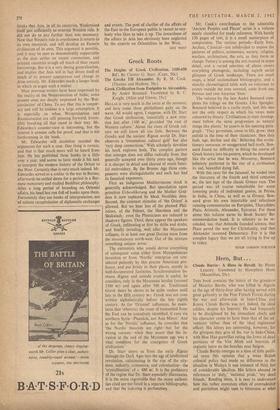Greek Roots
HELLAS is very much in the swim at the moment, and here come three philhellenes gaily on the
wave. All would agree, I suppose, with Dr. Starr
that Greek civilisation, 'essentially a new crea- tion just after 1100 BC,' provided 'the root of
Western culture.' About the roots of Greek cul- ture we still know all too little. Between the Greeks and the ancient tEgean world Dr. Starr observes a 'tremendous cultural gulf' but also `very deep connections.' With scholarly devotion his book explores both. The complex pattern that emerges does not differ radically from that generally accepted over thirty years ago, though it is sharper in detail and cleared of much fanci- ful embroidery. By the Bronze Age three com- ponents were distinguishable and each has had its fanatical exponents.
First an indigenous Mediterranean stock is generally acknowledged. But speculation upon
primitive Urbevolkerung and the Mother God-
dess is now replaced by bleak Neolithic data. Second, the constant stimulus of 'the Orient' is allowed. But we hear less of the plumed Phil- istines, of the Peleset, the Shardana and the Shakalash : even the Phoenicians are reduced to shadowy figures. Third, there appear the speakers of Greek, infiltrating at first by dribs and drabs, and finally invading, well after the Mycenean collapse, in at least one great Dorian wave from the mountainous north-west. Out of the mixture something unique arose.
The extremists who would derive everything of subsequent value either from Mesopotamian invention or from 'Nordic' enterprise are con- sidered patiently by this precise American pro- fessor, and put firmly in their places, mostly in well-documented footnotes. Synchronisation be- tween lEgean and outside events is useful, he considers, only in the Mycenean heyday (around 1300 sc) and again after 700 sc. Traditional
Greek dates he shows to be quite useiess until late in the fifth century BC: Greek was not even
written alphabetically before the late eighth century. As for 'Oriental' influences, he main- tains that 'wherever the route of transmittal from the East can be tentatively identified, it runs via northern Syria—Phoenicia, not Asia Minor.' And as for the 'Nordic' influence, he concedes that 'the Nordic theorists are right—but for the wrong reasons— when they assert that the in- vasion at the end of the Mycenean age was a vital condition for the emergence of Greek civilisation.'
Dr. Starr steers us from the early eEgean through the Dark Ages into the age of intellectual
revolution, culminating in the rise of the city- state, industry, commerce, and colonisation—the `crystallisation' of c. 680 BC. It is the prehistory of the region that Dr. Starr especially illuminates. It is the more regrettable that the many authori- ties cited are not listed in a separate bibliography, and that the indexing is perfunctory.
Mr. Cook's contribution to the admirable `Ancient Peoples and Places' series is a volume neatly classified for ready reference. With barely 150 pages of text, it is a small masterpiece of compression. The various periods—Early Iron, Archaic, Classical—are subdivided to expose the patterns of politics, economics, society, religion, warfare, architecture, the arts, as they form or change. Pottery is among the arts treated in some detail, and a varied selection of plates covers everything photogenic, including superb aerial glimpses of Greek landscape. There are small maps, a brief sectionalised bibliography, and a sketchy chronological table with no reference to events outside the area covered, aside from one Persian and two Assyrian 'fixes.'
The volume by the late Andre Bonnard com- pletes his trilogy on the Greeks. Like Spengler, Bonnard believed in a cyclic myth, and this was not the only respect in which his views were coloured by theory. 'Civilisations in their develop- ment follow the same progression as natural things like plants,' he asserts in his opening para- graph : 'They germinate, come to life, grow; they unfold in the time of their classicism; then they fade, age, decline and die.' Believing this evolu- tionary nonsense, or exaggerated half-truth, Bon- nard found no difficulty in fitting the course of Greek history into his pattern, which he developed like the artist that he was. Moreover, Bonnard infinitely preferred to the rise of a civilisation its sad, beautiful dying fall.
With this taste for the faisande, he waded into the literature of the fourth and third centuries Etc, the last laps of the classic Greece race. The period was of course remarkable for some towering peaks of individual genius, in Persia, in India, in China, as well as in Greece. Bon- nard gives his own inimitable and infectious running commentaries on Euripides, Thucydides, Plato, Aristotle, Alexander, Epicurus. For these alone this volume earns its Book Society Re- commendation band. It is salutary to be re- minded, too, that Aristotle founded science, that Plato paved the way for Christianity, and that Alexander invented Democracy. For it is this complex legacy that we are all trying to live up to today.
HUGH GORDON PORTEUS


































 Previous page
Previous page